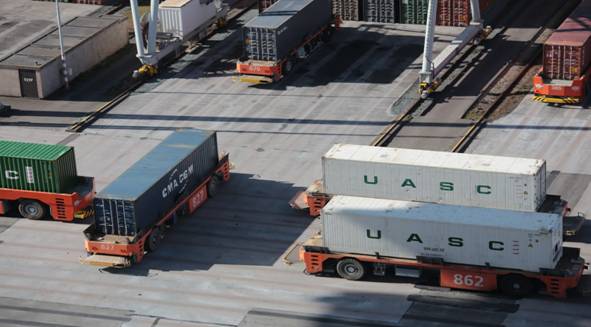Blog Uncategorized
How Digital Transformation Changes the Logistics

The entire sector of logistics businesses is undergoing a digital change. It is feasible to optimize process management more effectively while utilizing new technology, significantly lowering expenses.
Blockchain technology is one of the key engines of this revolution.
One of the most common mistakes is thinking of digitalization as a goal in and of itself rather than as a means to more effective business and logistical management. Productivity and competitiveness are improving as a result of businesses' digital transformation.
In this blog, we'll examine the industry's major issues and how these new models address them while providing a window of opportunity.
Toward a supply chain revolution using digital technology
The change in consumer behavior and customer expectations is the primary driver of the supply chain's digital transformation.
The current working style has been streamlined. Processes must not only be speedier but also more comfortable. The consumer requires a wide range of options for movement, purchases, and an expansion of collecting and return options for the goods they are going to buy. These elements exhibit a definite correlation between client happiness and their purchasing experience. This puts us in a very competitive market because they will be deciding factors that influence your decision to buy from one firm over another.
Traceability is one of the major logistics issues, and it is brought on by the lack of confidence between the parties involved. Blockchain technology has the potential to be extremely important in this situation.
Motives for the logistics industry's digital transformation
What went wrong with logistics up to this point, and why does logistics need a digital transformation?
- Speed: - that the packages are delivered without additional fees and in the quickest amount of time possible. This can be accomplished through route optimization and real-time data analysis to determine the best course of action. Another factor that customers consider when placing an order or making a purchase is speed.
- Delivery times: - Any business that wants to remain competitive must be able to accurately define delivery timeframes. This factor has emerged as a crucial consideration when evaluating customers.
- Hours of service: - This is just another area where we need to do better. While the collection must still be adaptable, it is also crucial to keep track of the shipment's location and delivery timing. In other words, coordination is required between all parties.
- Ease of return: - Returns are another logistical issue that many businesses face. In this regard, we must provide them with the most amenities possible. On the other side, there shouldn't be an additional expense associated with these processes.

Advantages of blockchain technology in logistics
Blockchain has mostly improved logistics by making it more transparent and efficient. The fact that it may serve as a guide makes it the ideal tool for tracking shipments, international contracts, payment processing, etc.
Blockchain provides a comprehensive solution:
1. A clear improvement in transparency
The network for data and information is managed more quickly and securely. As a result, the customer can receive real-time updates regarding his order and be informed of the pick-up or delivery dates. Similar to how it calculates each movement, the business is able to respond to any potential changes or issues.
2. Improves contact between companies
Occasionally more than one business is in charge of the product's shipment, storage, and delivery. If, for instance, the package is going to a faraway location, you can either use an external transport business or tiny distribution sites that operate independently. Blockchain technology allows for close interaction between businesses, allowing for the notification of any problems, updates, or breaking news, ensuring that the flow of trust and information is not interrupted. On a single network, everything is in a secure manner.
3. Management processes are improved
simpler strategic planning and company operations. The clients' needs are satisfied in part due to the accessibility of contact, the openness of the shipment, and other elements. mostly because they provide correct information regarding their delivery schedules, purchases, trustworthy user ratings, etc. Exactly every issue that the more traditional logistical models had.
4. Total security in payments
Undoubtedly one of the most crucial issues, and this is not only about consumer convenience. The same is true for the business itself, whether it is handling its own shipments and managing them, or working with outside companies to carry or store goods.
5. Cost Reduction
Building a cleaner, more modern, and safer information network is made possible by blockchain technology. All of these advantages enable businesses to cut expenditures (cargo tracking, additional security charges, paper delivery notes, etc.).
logistics companies are undergoing a digital makeover. And its best example is blockchain technology. A necessity for warehouses of the future and a competitive advantage today. At IBR Infotech, we are aware that the key is not to invest in new technology, but rather to carefully analyze business needs, consider the pros and cons, and gauge the financial impact of each innovation. Our solutions offer tangible advantages that might help your business grow by increasing its profitability and competitiveness.



